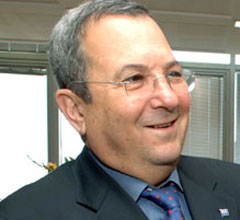Barak: Arab neighbourhoods in Jerusalem can be Palestinian capital
 Jerusalem - Some Arab neighbourhoods of Jerusalem could form the capital of the future Palestinian state, a senior Israeli minister said in an interview Wednesday.
Jerusalem - Some Arab neighbourhoods of Jerusalem could form the capital of the future Palestinian state, a senior Israeli minister said in an interview Wednesday.
"Our basic position is that Jerusalem is the capital of Israel but that we can find a formula under which certain neighbourhoods, heavily populated Arab neighbourhoods, could become in a peace agreement part of the Palestinian capital that of course will include also the neighbouring villages around Jerusalem," Defence Minister Ehud Barak told the al-Jazeera news channel.
He did not mention whether that would include quarters of the Old City of Jerusalem, which houses the disputed Temple Mount/Noble Sanctuary, sacred to both Jews and Muslims.
Barak heads Israel's centre-left Labour Party, the largest coalition partner in the government of Israeli Prime Minister Ehud Olmert of the ruling, centrist Kadima faction.
A former prime minister, he already offered Palestinian sovereignty in parts of Arab East Jerusalem during the 2000 Camp David peace negotiations with late Palestinian leader Yasser Arafat.
But those negotiations ended in stalemate, paving the way for the outbreak of years of tit-for-tat violence and a freeze in the peace process.
Olmert and current Palestinian President Mahmoud Abbas revived the peace negotiations late last year, pledging the strive to reach an agreement before US President George W Bush leaves office in January 2009.
But Olmert has said he wants to postpone a settlement on the highly-sensitive issue of Jerusalem until later and instead reach a framework agreement on other core issues of the Israeli-Palestinian conflict. Aides to Abbas have said the Palestinian president has refused to leave Jerusalem out of an agreement.
Olmert's announcement that he will resign after his party elects a new leader later this month has cast further doubt on whether the sides will meet their end-of-year deadline to reach a deal. The Israeli premier is under police investigation into suspicions of corruption. His announcement has made early elections next spring, a year ahead of schedule, likely.
The Palestinians want East Jerusalem, which Israel captured from Jordan during the 1967 Arab-Israeli war and has since annexed, as the capital of their future state.
Israel however wants Jewish settlements built on West Bank land in and near East Jerusalem to be part of its capital, and has vowed that it will continue to build in those settlements.
"We are not expanding (settlements.) We didn't announce even a single new settlement, but there is a well-known dispute. We clearly believe that within Jerusalem we have the right to build as we need," Barak said.
On another highly-sensitive issue in the negotiations, Barak said no Israeli prime minister would allow large numbers of Palestinian refugees to return to what is now Israel.
"I can't see any Israeli prime minister, right or left, past or future, who will agree to accept even a single Palestinian refugee into Israel based on the right of return. That was my position when I was prime minister. It was the position of any prime minister, from Rabin to Peres from Shamir to Begin, and it will be the position of Israel in the future," he said.
Israel may nonetheless allow the return of some refugees in "certain humanitarian" cases on a "very limited scale," he said. He was referring to family reunification, Barak said.
He confirmed that Israel's controversial West Bank barrier would form the basis for the future border between it and the future Palestinian state.
But Israel would change the route of the barrier and rebuild it in areas where it would deviate from the agreed-on border. (dpa)